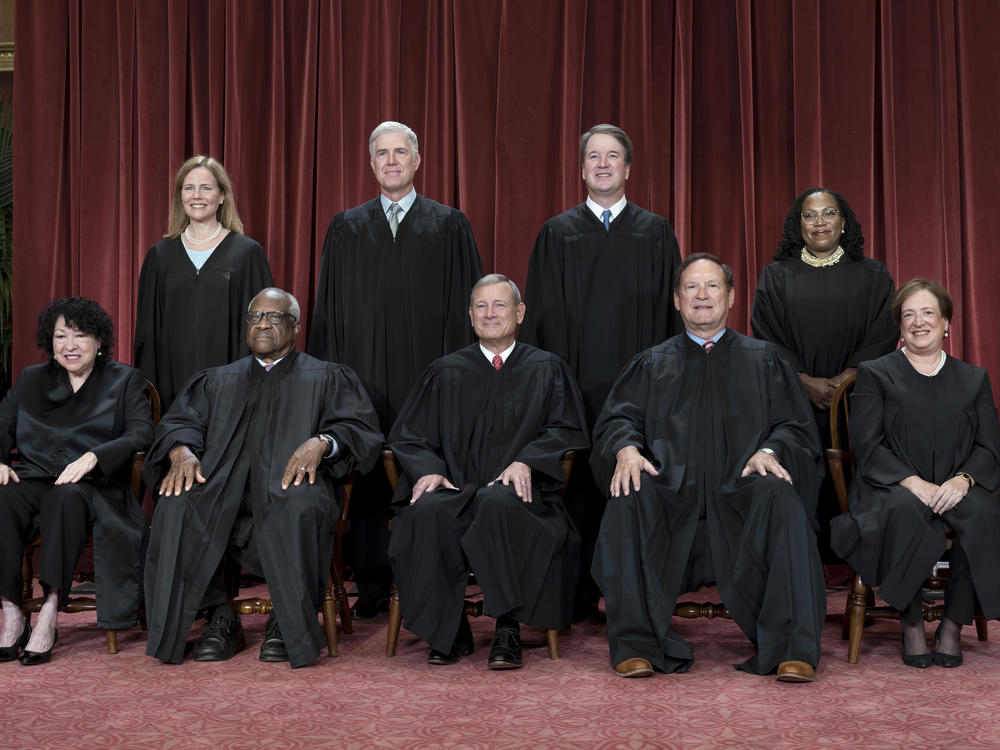Section Branding
Header Content
The Supreme Court adopts first-ever code of ethics
Primary Content
Updated November 13, 2023 at 4:56 PM ET
The U.S. Supreme Court Monday adopted its first-ever ethics code, bowing to pressure from Congress and the public. All nine justices signed onto the new code, which was instantly criticized for lack of an enforcement mechanism.
In an unsigned statement, the justices said though there has been no formal code, they have long abided by certain standards.
"The absence of a Code, however, has led in recent years to the misunderstanding that the Justices of this Court, unlike all other jurists in this country, regard themselves as unrestricted by any ethics rules," they wrote. "To dispel this misunderstanding, we are issuing this Code, which largely represents a codification of principles that we have long regarded as governing our conduct."
Public trust in the court has fallen amid revelations that Justice Clarence Thomas received gifts and travel from Harlan Crow, a Republican donor. Justice Samuel Alito has also been criticized for failing to disclose a fishing trip with Paul Singer, a big Republican donor with cases before the Supreme Court.
In recent weeks, Justices Amy Coney Barrett and Elena Kagan publicly supported calls for an ethics code.
What does the code say?
With the release of the code Monday, the court is trying to be somewhat specific about what justices can and cannot do. But, there is a lot they can do and no enforcement mechanism as to what they are supposed not to do.
For example, the code is quite specific about financial transactions: Justices can make a real estate transaction, as long as it's not before the court. But the code simply reaffirms the commitment to the disclosure provisions that are in the existing code for all federal judges.
The code is also specific about recusal if family members, such as spouses, children or grandchildren, have a case before the court or is a lawyer before the court.
But the code also makes exceptions for justices that may not apply to lower court judges. For instance, a justice doesn't have to recuse if his or her relative files a friend of the court brief because the court receives so many of these briefs, sometimes over 100 in a single case, and it has loosened the rules on these briefs being filed.
In recent months, critics have raised concerns about Justice Thomas' wife, Virginia Thomas, and her activities to promote political causes that end up before the court. The code says that if a spouse or child living with the justice has a substantial interest in the outcome of a case — financial or any other interest — the justice is supposed to recuse. That would have meant, for example, that Justice Thomas would have to recuse in cases in which his wife has played a major role. Last year, Thomas did not recuse, and was the sole dissenter, in a case about whether former President Trump's White House records had to be turned over to the House committee investigating the Jan. 6 riot at the U.S. Capitol, despite Ginni Thomas' texts to then-White House Chief of Staff Mark Meadows urging him to take steps to overturn the 2020 presidential election results.
Others have raised concerns about Justice Sonia Sotomayor's use of court staff in setting up her schedule and trips including her book tour. Now, the court's new code says that for security reasons, justices are permitted to use their office resources in making plans. And, the code even specifies that a justice may appear at events where their books are being sold.
What have the court's critics said about the ethics code?
Critics remain unsatisfied, particularly with the code's lack of enforcement provision.
Progressive group Take Back the Court said in a statement, "With 53 uses of the word 'should' and only 6 of the word 'must,' the court's new 'code of ethics' reads a lot more like a friendly suggestion than a binding, enforceable guideline." Another group, United for Democracy, said, "While it's great to see the Supreme Court finally respond to public pressure and acknowledge that they have serious ethics and corruption issues that must be addressed, the code of ethics announced today is woefully inadequate."
Meanwhile, NYU School of Law professor Stephen Gillers called the code "pretty decent."
"It is more detailed than I expected," Gillers said, even though there is "no enforcement" mechanism.
Copyright 2023 NPR. To see more, visit https://www.npr.org.
Bottom Content

